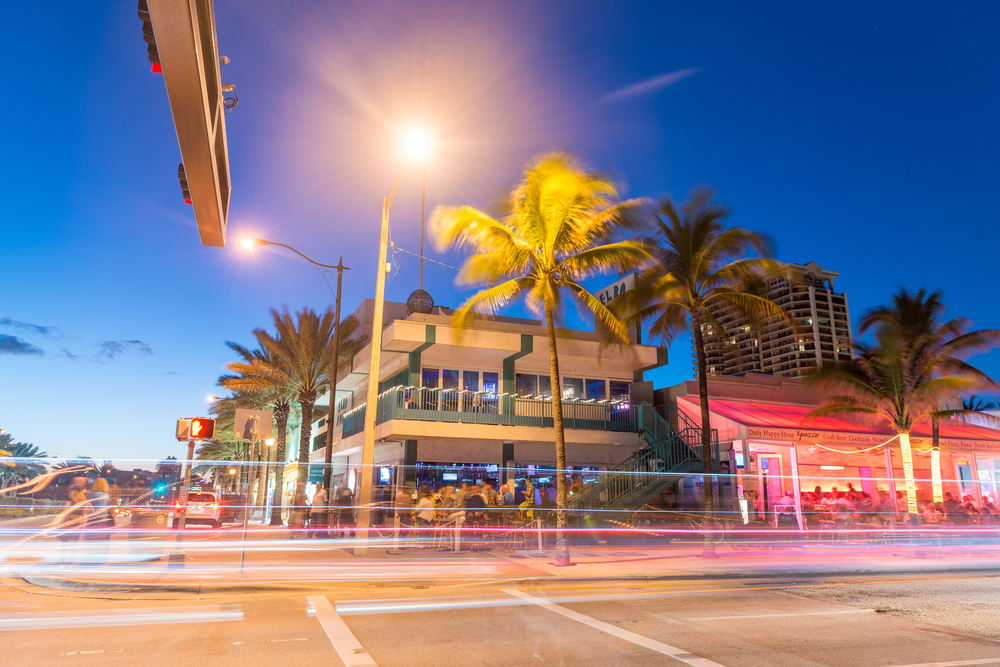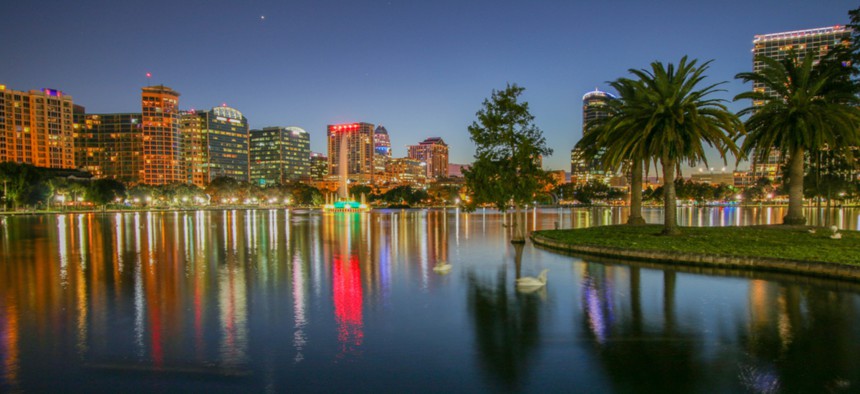Connecting state and local government leaders
As Orlando gets its first “bar czar,” other cities focus on balancing quality-of-life issues with supporting businesses that thrive after sundown.
ORLANDO — When an after-hours venue called Club Nokturnal opened its doors on Amelia Street in 2015, late night revelers downtown weren’t the only ones to take notice. The establishment also drew the attention of city officials, who worried about the impact the club would have on the law enforcement officers policing the city’s already vibrant and occasionally chaotic nightlife.
As a licensed bottle club, Nokturnal was prohibited from selling any booze—but its patrons were free to bring in their in own liquor and continue partying well past the 2 a.m. alcohol cut-off enforced at other downtown dance clubs and watering holes. In several other Florida locales, including Tampa, Volusia County and Pensacola, the late-night BYOB business model was seeming to be a recipe for mayhem, with the clubs attracting drugs, violence and other criminal mischief. To head off any trouble, the Orlando City Council swiftly imposed a moratorium on any new after-hours clubs and convened a “Nightclubs Task Force” to study the issue.
While Nokturnal’s existence was short-lived—the owner shut it down just a few months later—the episode had a lasting impact on the city.
City officials eventually banned after-hours clubs entirely and expanded the task force’s mission to take a look at all aspects of Orlando’s nighttime economy. More recently, the city has tapped its first ever “Nighttime Economy Project Manager,” a sort of ombudsman who will serve as a liaison between the Orlando’s nightlife industry and City Hall, and created a new Nighttime Economic Committee made up of city and industry officials to work on any issues that arise and help guide policy.
“The bigger picture of taking a step back was looking at what are the best practices in continuing to find and foster a vibrant and secure and diverse nighttime economy,” David Barilla, the assistant director of Orlando’s Downtown Development Board & Community Redevelopment Agency, explained in an interview.
“You can look at it through a microscope and say ‘OK, this is about bars and nightclubs,’ but it’s really not,” Barilla said. “It’s about having the best amenities downtown that cater to all different things people do. We can’t just say we want to have a good party scene, but forget about [the fact] that three hours later, someone’s got to show up at work in one of our high-rises—and how does that transition happen?”
To understand its nightlife economy better, the Orlando hired the Responsible Hospitality Institute, a Scotts Valley, California-based non-profit that helps cities assess their “hospitality zones,” to do an in-depth analysis. The city’s new night manager position, Barilla said, grew out of RHI’s recommendations and was essentially an “acknowledgment” that the Orlando’s nighttime economy was different than the daytime economy — and important enough that oversight of it shouldn’t just be tacked onto someone else’s job description.
Dominique Greco Ryan, the 28-year-old chosen for the job, is no stranger to the city’s nightlife, having worked for several years for a company that operates 11 businesses along Orange Avenue, a crowded strip in the heart of the city’s downtown. “I’ve worked in almost every single job in the hospitality industry and eventually moved up into an operational management position that I have been in for the last six or seven years,” says Ryan.
While her official duties are still being figured out to some degree, Orlando’s new night manager—or “Bar Czar,” as some are calling her—will be earning around $70,000 annually and sometimes work into the wee hours of the morning observing ”firsthand nightlife activity and closing time management tactics,” according to a description of the position advertised by the city earlier this year.
It’s a solid investment when one considers the potential financial impact of a city’s nighttime economy, according to advocates.
“Over the years, you see cities like New York, Seattle, San Francisco, Edmonton, London and Sydney actually documenting the economic value of their nightlife,” said Jim Peters, who as RHI’s president, is the nation’s leading guru on nighttime economy issues. “In San Francisco, they estimate the economic engine for nightlife is $6 billion and it creates 60,000 jobs for people who work at night.”
Peters, who has been promoting nighttime economy concepts ever since he first heard the term in London in the early 2000s, says people often fail to realize just how significantly businesses operating after sundown drive the daytime economy. “For every restaurant, they have to have food deliveries and beverage deliveries and linen deliveries and paper goods and pest control and they hire graphic artists to design ads and menus and then that supports the local weeklies or papers… So now you have writers and printers and the people who deliver the papers and magazines, all of these jobs that are directly related to the business itself.”
Orlando isn’t the only Florida city implementing a new nighttime economy staff. Fort Lauderdale has budgeted close to $1.4 million for a new Nighttime Economy Team that will include a nighttime manager, who will coordinate and oversee an 11-person task force comprised of one police lieutenant, three police officers, a fire inspector, a code enforcement officer, a parks foreman and several maintenance workers. Assuming the 2018 budget is approved, the team will be up and running by January, according to Fort Lauderdale City Manager Lee Feldman.

Feldman, the current president of the International City / County Management Association, said he wanted to appoint an entire staff up front to hopefully streamline the way the new night-focused division functions. “What I wanted to avoid is, if there’s a sanitation issue and someone has to go to parks and recreation and say ‘Hey, I need some people,’ which is what liaisons and ombudsmen do. I’m trying to tackle this by giving them the resources they need upfront—people, vehicles, equipment—so they don’t have to go beg and borrow from other departments to address issues.”
The goal, Feldman explains, is to make sure the city is “proactive and not reactive” and constantly monitoring and “making sure things don’t get out of hand, because once they do, it’s always hard to bring that back—a lot of credibility gets lost.”
To that end, a key focus will be the informal entertainment areas that have been popping up around the city. The FAT Village arts district, a newly revitalized warehouse district just north of downtown Fort Lauderdale, used to draw about 200 people to its art walk on the last Saturday of every month. Now, it’s attracting around 2,000 people — a sizeable enough crowd to create unexpected challenges, says Feldman. “Those are things we want to encourage, but we also have a responsibility to make sure that they’re done in a safe way. We don’t want something happening and then say, ‘Alright, next month we have to fix this,’ I want someone out there, picking up on these trends and jumping in at the right moment so we don’t have problems.”
Other cities across the country have also jumped on the nighttime economy bandwagon. Earlier this year, Iowa City elected its first nighttime mayor and New York City Mayor Bill de Blasio, recently created a new “nightlife ambassador” position to function as a liaison between government officials and nightclubs. Pittsburgh ushered in its first “nighttime economy manager” three years ago and San Francisco has been regulating its nightlife for years through its Entertainment Commission. The “night mayor” concept has also been spreading like wildfire across Europe, with cities like Amsterdam and London leading the way.
It’s a reality that more local governments will need to confront as people continue to flock to cities and nighttime businesses and residents try to co-exist, according to Peters.
Disputes over sound, for instance, can arise if a city doesn’t have residential development standards in place requiring them to soundproof their exteriors. Likewise, if a nightlife business decides to set up shop in a heavily residential section of the city, then that business would be well advised to find ways to mitigate the sound emanating from their walls lest they aggravate sleeping residents.
Other conflicts Peters sees frequently involve litter and public urination. “You allow the evolution of a nightlife district. You bring in 20,000 people that are all drinking… and then at 2 a.m. you say, everyone has to leave and at the same time you don’t provide any public facilities. What do people do?” he asks. Likewise, if trash cans are overflowing with garbage on a Saturday or Sunday morning is that the problem of the bars or restaurants—or is the onus on the city to add more waste receptacles to the areas and schedule more trash pick-ups?
At the end of the day, these sorts of issues “beg for an overriding body that is able to balance all these stakeholders,” Peters said, and cities like Orlando and Fort Lauderdale are among those paving the way. “It’s a global experiment and it will be groundbreaking—and they’ll set the standard and they’ll help other cities figure out from their own mistakes how to do it better.”
Amy Keller is a journalist based in Orlando.

NEXT STORY: Will New York Stop Arresting People for Evading Subway Fares?



